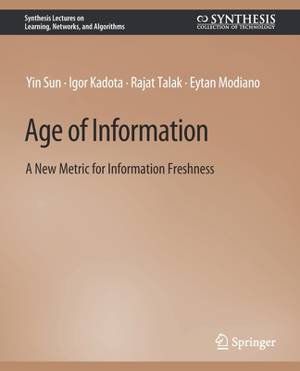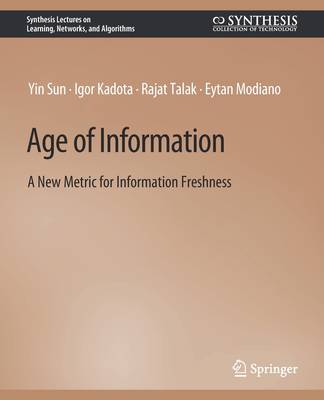
- Afhalen na 1 uur in een winkel met voorraad
- Gratis thuislevering in België vanaf € 30
- Ruim aanbod met 7 miljoen producten
- Afhalen na 1 uur in een winkel met voorraad
- Gratis thuislevering in België vanaf € 30
- Ruim aanbod met 7 miljoen producten
Zoeken
Age of Information
A New Metric for Information Freshness
Yin Sun, Igor Kadota, Rajat Talak, Eytan Modiano
€ 68,95
+ 137 punten
Uitvoering
Omschrijving
Information usually has the highest value when it is fresh. For example, real-time knowledge about the location, orientation, and speed of motor vehicles is imperative in autonomous driving, and the access to timely information about stock prices and interest rate movements is essential for developing trading strategies on the stock market. The Age of Information (AoI) concept, together with its recent extensions, provides a means of quantifying the freshness of information and an opportunity to improve the performance of real-time systems and networks. Recent research advances on AoI suggest that many well-known design principles of traditional data networks (for, e.g., providing high throughput and low delay) need to be re-examined for enhancing information freshness in rapidly emerging real-time applications. This book provides a suite of analytical tools and insightful results on the generation of information-update packets at the source nodes and the design of network protocols forwarding the packets to their destinations. The book also points out interesting connections between AoI concept and information theory, signal processing, and control theory, which are worthy of future investigation.
Specificaties
Betrokkenen
- Auteur(s):
- Uitgeverij:
Inhoud
- Aantal bladzijden:
- 204
- Taal:
- Engels
- Reeks:
Eigenschappen
- Productcode (EAN):
- 9783031792922
- Verschijningsdatum:
- 11/12/2019
- Uitvoering:
- Paperback
- Formaat:
- Trade paperback (VS)
- Afmetingen:
- 190 mm x 235 mm
- Gewicht:
- 399 g

Alleen bij Standaard Boekhandel
+ 137 punten op je klantenkaart van Standaard Boekhandel
Beoordelingen
We publiceren alleen reviews die voldoen aan de voorwaarden voor reviews. Bekijk onze voorwaarden voor reviews.











